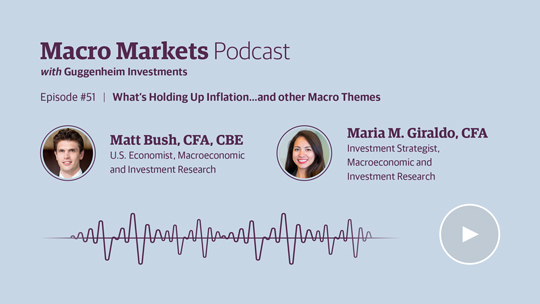/institutional/perspectives/portfolio-strategy/consistent-strategy-through-volatile-times
Portfolio Management Outlook: Consistent Strategy Through Volatile Times
Staying defensive and getting paid to do so.
As we near the end of 2023, it is safe to conclude that we have come through a period of unprecedented volatility that has left a wide range of possible outcomes going forward. We are coming off multiple years of poor returns across fixed income, particularly for longer duration, high-quality investments. But the past looks a lot worse than the future, and the worst drawdown for an asset class can prove to be a very attractive entry point for prudent investors as the end of the Federal Reserve’s (Fed) aggressive rate hiking cycle will provide respite. The next major policy moves are likely to provide strong tailwinds for fixed income.
We continue to expect elevated volatility in the economy and markets, as well as a policy response to these conditions. This argues for the importance of diversification in asset allocation and within portfolios. The U.S. consumer has remained resilient, driving better-than-expected economic growth, but the risk of recession in coming quarters remains higher than normal. Tailwinds that have supported consumption and growth, such as the positive impact of sizeable fiscal spending and the benefits of rapid disinflation, will start to be overtaken by headwinds, such as the lagged impact of monetary policy, tighter financial conditions, reduced bank lending, and rising geopolitical risk. We will be watching for the credit impact of nominal and real interest rates at 15-year highs, trends in the shrinking Fed balance sheet, and the evidence that will drive the data-dependency of the Fed’s monetary policy decision-making framework.
Our sector teams have identified positive technical trends that helped to support spreads, but we remain vigilant for signs of credit deterioration as the economy slows and the bite of higher rates starts to be felt by issuers. At a high level, this background leads us to prepare ourselves for a wide range of scenarios, including a soft landing or severe economic stress—and everything in between. Our portfolio strategy has remained consistent throughout the year. This means continuing to upgrade the credit profile of our portfolios and to seek strong income generation and the potential for capital appreciation. We have grown our exposure in high quality sectors, particularly in Agency RMBS and in structured credit investments such as non-Agency RMBS, senior tranches of CLOs, and commercial ABS. While spreads in these sectors have remained disproportionately wide, pricing in investment-grade corporate credit risk is closer to fair value and we have reduced our exposure.
Whether we are in for a soft landing or an outright recession, the yield curve will likely steepen. Given our outlook for a recession in the first half of 2024, our bias is towards a bull steepening. In terms of market opportunities, longer duration exposure is expressed via Agency RMBS due to credit quality, wider spreads, and better convexity profile.
In sum, we are building high quality, defensive portfolios positioned for attractive income and low likelihood of credit impairment. At the same time, we are reserving dry powder so that we can take on more credit beta if the environment or the pricing justifies it.
—By Anne Walsh, Steve Brown, Adam Bloch, and Evan Serdensky
Important Notices and Disclosures
This material is distributed or presented for informational or educational purposes only and should not be considered a recommendation of any particular security, strategy or investment product, or as investing advice of any kind. This material is not provided in a fiduciary capacity, may not be relied upon for or in connection with the making of investment decisions, and does not constitute a solicitation of an offer to buy or sell securities. The content contained herein is not intended to be and should not be construed as legal or tax advice and/or a legal opinion. Always consult a financial, tax and/or legal professional regarding your specific situation.
This material contains opinions of the authors, but not necessarily those of Guggenheim Partners, LLC or its subsidiaries. The opinions contained herein are subject to change without notice. Forward-looking statements, estimates, and certain information contained herein are based upon proprietary and non-proprietary research and other sources. Information contained herein has been obtained from sources believed to be reliable but are not assured as to accuracy. Past performance is not indicative of future results. There is neither representation nor warranty as to the current accuracy of, nor liability for, decisions based on such information.
Investing involves risk, including the possible loss of principal. Investments in fixed-income instruments are subject to the possibility that interest rates could rise, causing their values to decline. High yield and unrated debt securities are at a greater risk of default than investment grade bonds and may be less liquid, which may increase volatility. Investors in asset-backed securities, including mortgage-backed securities and collateralized loan obligations (“CLOs”), generally receive payments that are part interest and part return of principal. These payments may vary based on the rate loans are repaid. Some asset-backed securities may have structures that make their reaction to interest rates and other factors difficult to predict, making their prices volatile and they are subject to liquidity and valuation risk. CLOs bear similar risks to investing in loans directly, such as credit, interest rate, counterparty, prepayment, liquidity, and valuation risks. Loans are often below investment grade, may be unrated, and typically offer a fixed or floating interest rate.
Guggenheim Investments represents the following affiliated investment management businesses of Guggenheim Partners, LLC: Guggenheim Partners Investment Management, LLC, Security Investors, LLC, Guggenheim Funds Distributors, LLC, Guggenheim Funds Investment Advisors, LLC, Guggenheim Partners Advisors, LLC, Guggenheim Corporate Funding, LLC, Guggenheim Partners Europe Limited, Guggenheim Partners Japan Limited, GS GAMMA Advisors, LLC, and Guggenheim Partners India Management.
GPIM 59505
VIDEOS AND PODCASTS

Maria Giraldo, Investment Strategist for Guggenheim Investments, joins Asset TV’s Fixed Income Masterclass.

Matt Bush and Maria Giraldo join the Macro Markets podcast to discuss our newly published Quarterly Macro Themes for 1Q 2024.
©
Guggenheim Investments. All rights reserved.
*Assets under management is as of 3.31.2024 and includes leverage of $14.5bn. Guggenheim Investments represents the following affiliated investment management businesses of Guggenheim Partners, LLC: Guggenheim Partners Investment Management, LLC, Security Investors, LLC, Guggenheim Funds Distributors, LLC, Guggenheim Funds Investment Advisors, LLC, Guggenheim Corporate Funding, LLC, Guggenheim Partners Europe Limited, Guggenheim Partners Japan Limited, and GS GAMMA Advisors, LLC.
By choosing an option below, the next time you return to the site, your home page will automatically
be set to this site. You can change your preference at any time.
We have saved your site preference as
Institutional Investors. To change this, update your
preferences.
United States Important Legal Information
By confirming below that you are an Institutional Investor, you will gain access to information on this website (the “Website”) that is intended exclusively for Institutional Investors and, as such, the information should not be relied upon by individual investors. This Website and any product, content, information, tools or services provided or available through the Website (collectively, the “Services”) are provided to Institutional Investors for informational purposes only and do not constitute a recommendation to buy or sell any security or fund interest. Nothing on the Website shall be considered a solicitation for the offering of any investment product or service to any person in any jurisdiction where such solicitation or offering may not lawfully be made. By accessing this Website, you expressly acknowledge and agree that the Website and the Services provided on or through the Website are provided on an as is/as available basis, and except as partnered by law, neither Guggenheim Investments and it parents, subsidiaries and affiliates nor any third party has any responsibility to maintain the website or the Services offered on or through the Website or to supply corrections or updates for the same. You understand that the information provided on this Website is not intended to provide, and should not be relied upon for, tax, legal, accounting or investment advice. You also agree that the terms provided herein with respect to the access and use of the Website are supplemental to and shall not void or modify the Terms of Use in effect for the Website. The information on this Website is solely intended for use by Institutional Investors as defined below: banks, savings and loan associations, insurance companies, and registered investment companies; registered investment advisers; individual investors and other entities with total assets of at least $50 million; governmental entities; employee benefit (retirement) plans, or multiple employee benefit plans offered to employees of the same employer, that in the aggregate have at least 100 participants, but does not include any participant of such plans; member firms or registered person of such a member; or person(s) acting solely on behalf of any such Institutional Investor.
By clicking the "I confirm" information link the user agrees that: “I have read the terms detailed and confirm that I am an Institutional Investor and that I wish to proceed.”